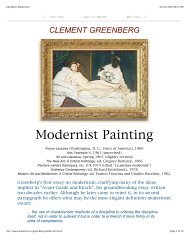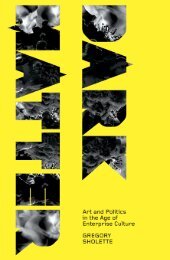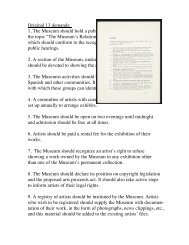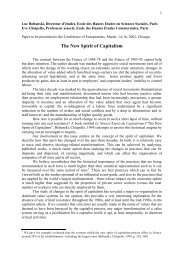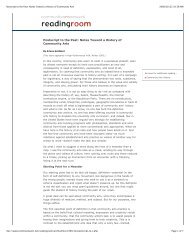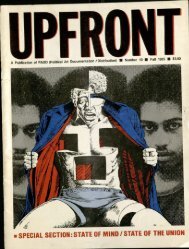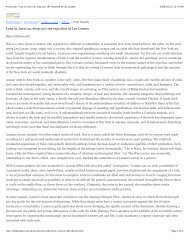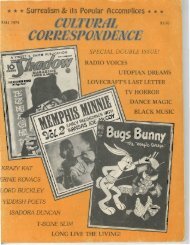Screen - Dark Matter Archives
Screen - Dark Matter Archives
Screen - Dark Matter Archives
You also want an ePaper? Increase the reach of your titles
YUMPU automatically turns print PDFs into web optimized ePapers that Google loves.
38 It is through an emphasis on the body and the impossibility ofthis locale. In fact, as we have seen, the signs of social identity3914 C MacCabe.its exhaustion in its representations that one can understand theare as unstable as all the rest. Olympia has a maid, which seem~Economy and material basis with which the unconscious of a discursive forma [Q situate her somewhere on the social scale; but the maid is black,Society. op cit. tion disrupts the smooth functioning of the dominant ideologiesconvenient sign, stock property of any harlot's progress, derealised,P 303.and that this disruption is not simply the chance movement of thetelling us little or nothing of social class. She receives elaboratesignifier but the specific positioning of the body in the economic,bouquets of flowers , hut they are folded up in old newspaper; shepolitical and ideological practices,Uis faubourienne. Ravenel is right, in her face and her disabusedstare, but cQurtisane in her stately pose, her delicate shawl, herThis seems to address the quest jon which preoccupies me, andprecious slippers.which I would rephrase as follow s: Is there a differe nce - aLet me make what I am saying perfectly clear. Olympia refusesdifference with immediate. tactical implications - between anto signify - to be read according to the established codings for theallowed, arbitrary and harmless play of the signifier and a kind ofplay which contributes to a disruption of the smooth functioningnude, and take her place in the Imaginary. But if the picture wereto do anything more than that, it (she) would have to be given,of the dominant ideologies? If so - I am aware that I probablymuch more clearly, a place in another classed code - a place inexceed MacCabe's meaning at this point - artistic practice willhave to address itself to ·the specific positioning of the body inthe economic, political and ideological practices'; it cannot takeits own disruptions of the various signifying conventions as somehowrooted. autornaticaiJy, in the struggle to control and positionthe body in political and ideological terms; it has to articulate therelations between its own minor acts of disobedience and tbemajor struggles - the class struggle - which define the bodyand dismantle and renew its representations. Otherwise its actswi ll be insignificant - as Manet's were. I believe, in 1865.There is a danger of sounding a hectoring, or even a falselyoptimistic. note at this poim . Only a sense that the burden ofmodernity in the arts is this insignificance will save us from theabsurdity of feeling that we are not involved in Manet's failure;it might lead us to make a distinction between tbose works. likeOlympia. which succumb to modernity as a fate they do not welcome,and those bland battalions which embrace emptiness anddiscontinuity as their life's blood, their excuse their 'medium'.Olympia is not like these. its progeny; its failure to mean much isa sign of a certai n obdurate strength. It is adntirable in 1'865 for a .picture not to situate Woman in the space - the dominated andderealised space - of male fantasy. But this refusal - to soundagain the demanding note - is compatible with situating Womansomewhere else: making her part of a fully coded, public andfamiHar world, to which fantasy has entry only in its real, uncomfortable,dominating and dominated form. One could imagine adifferent picture of a prostitute, in which there would be depictedthe production of the sexual subject (the subject 'subjected', sub·ject to and subject of fantasy). Even. perhaps, the production ofthe sexual Subject in a particular class formation. But CO do that- CO put it crudely - Manet would have had to put a far lessequivocal stress on the signs of social identity in this body andthe code of classes. She would have to be given a place in theworJd which manufactures the Imaginary. and reproduces therelations of dominator/dominated, fantisiser/ fantasised.The picture would have to construct itself a position - it wo uldbe necessarily a complex and elliprical position. but it would haveto be readable somehow - within the actual conflict of imagesand ideologies surrounding the practice of prosotution in 1865.What that conflict consisted in was indicated, darkly, by thecritics' own fumbling for words that year - the shift betweenpetite faubourienne and courtisane. In other words, between theprostitute as proletarian, recognised as such and recognising herselfas such, and the other, 'normal' Second Empire situation: theendless exchange of social and sexual meanings, in which theprostitute is alternately - fantastically - recognised as proletarian,as absolutely abject, shameless, seller of her own flesh,and then, in a flash. misrecognised as dominator, as femme fa tale,as imaginary ru ler. (This dance of recognition and misrecognitionis one in which the prostitute shares, to a certain degree. But sheis always able - indeed liable - to flip back to the simple assess·mem of herself as JUSt another seller of an ordinary form of labourpower. She has to be constantly re-engaged in the dance of ideology.and made to coll ude again in her double role.)I think I should have to say that in the end Olympia lends itspeculiar confirmation to the latter structure, the dance of ideology.It erodes the term s in which the normal recognitions are enacted,but it leaves the structure itself intact. The prostitute is stilldouble. abject and dominant, equivocal. unfixed. To escape thatstructure what would be needed would be. exactly, another set ofterms - terms which would be discovered, doubtless. in the actof unsen li ng the old codes and conventions, but which would havethemselves to be settled, consistent, forming a f"inj shed sentence.



